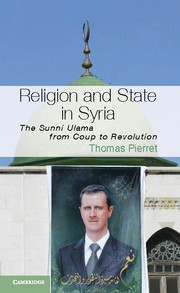Book contents
- Frontmatter
- Contents
- Acknowledgements
- A Note on Conventions
- Introduction
- Prologue
- 1 The Era of the ‘Founding Sheikhs’ (1920–1979)
- 2 Landscapes after the Battle (1979–2007)
- 3 (Re)defining Orthodoxy against Reformist Trends
- 4 The Turban and the Chequebook
- 5 Ulama and Islamists in the Political Field
- 6 Reforms and Revolution
- Conclusion
- Bibliography
- Index
Conclusion
Published online by Cambridge University Press: 05 February 2013
- Frontmatter
- Contents
- Acknowledgements
- A Note on Conventions
- Introduction
- Prologue
- 1 The Era of the ‘Founding Sheikhs’ (1920–1979)
- 2 Landscapes after the Battle (1979–2007)
- 3 (Re)defining Orthodoxy against Reformist Trends
- 4 The Turban and the Chequebook
- 5 Ulama and Islamists in the Political Field
- 6 Reforms and Revolution
- Conclusion
- Bibliography
- Index
Summary
Three words could summarise the challenges faced by the Syrian ulama in the twentieth century: autonomy, relevance, and flexibility. Autonomy from the state had to be preserved in the realms of administrative control, specialised religious education, and economic resources. Resisting the embrace of the state administration was probably less acute a problem in Syria than in other Muslim countries. The young Syrian republic did not inherit deep-rooted official Islamic institutions, and the political instability of the first two decades after independence defeated attempts to replicate the religious policies of Mustafa Kemal and Nasser. In the 1960s, the Ba‘th’s revolutionary stance translated into the exclusion of ‘reactionary’ ulama from the state apparatus. From then on, the religious field would be managed by strong mukhabarat and a weak administration. This trend took an even more radical form after the 1979–82 Islamic uprising, following which the regime engineered the decay of the Ministry of Awqaf, while outsourcing the management of the religious field to loyal private networks (the Kaftariyya, the al-Farfur family, the Nabhaniyya).
The ulama also maintained significant autonomy with respect to the training of junior clerics. Indeed, the twentieth-century institutionalisation of specialised religious teaching has not entailed the disappearance of the mechanisms of social reproduction that, in the traditional informal system, have allowed scholars to appoint their successors from among their children and favourites. The first reason for this is that a significant proportion of the Syrian men of religion have been trained in private institutes that offer the advantages of modern education – that is to say, the ability to produce literate elites on an unprecedented scale – while preserving the advantages of the master–disciple relationship. Second, even graduates of the state-run faculty of sharia tend in parallel to follow a ‘free’ curriculum in order to accumulate, through their association with venerable scholars, the symbolic capital that is necessary for their admission into the religious elite. Third, it has remained possible to reach the summit of the Syrian religious elite by attending only informal study circles – that is, without having a formal diploma in religious sciences.
- Type
- Chapter
- Information
- Religion and State in SyriaThe Sunni Ulama from Coup to Revolution, pp. 239 - 244Publisher: Cambridge University PressPrint publication year: 2013



